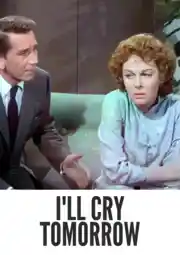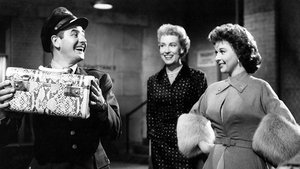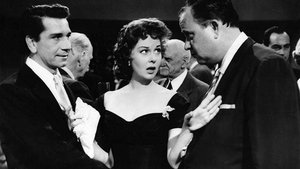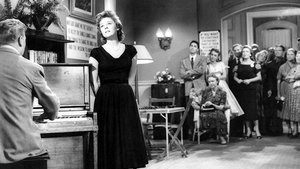Contact: [email protected]
Video Sources 0 Views

I’ll Cry Tomorrow Colorized 1955: Best Colorized Journey into the Past
Synopsis
[ez-toc]





Introduction
In the vast tapestry of cinematic history, certain films stand as timeless monuments, inviting audiences to traverse the corridors of the past. One such cinematic jewel is the 1955 biographical masterpiece, “I’ll Cry Tomorrow Colorized.” This poignant exploration of the life of Lillian Roth, an acclaimed actress and singer, recently underwent a transformative journey through the art of colorization. As we delve into the realms of this classic, we unravel the intricacies of its making, the delicate process of colorization, and its enduring impact on the timeless narrative.
Read Media File Transfer Agreement: Terms and Conditions
Read FAQ
The Making of “I’ll Cry Tomorrow Colorized”
At the heart of “I’ll Cry Tomorrow Colorized” lies the compelling life story of Lillian Roth, a woman whose journey became the canvas for this biographical masterpiece. Directed by Daniel Mann, the film unfolds Roth’s trajectory from stardom to the gripping battles with addiction, ultimately culminating in a triumphant comeback.
Susan Hayward, renowned for her exceptional performances, steps into the challenging role of Lillian Roth. In the recently colorized version, Hayward’s portrayal breathes new life into Roth’s character, capturing the essence of the era with a vividness that was previously absent. The decision to reintroduce this classic in color adds a layer of authenticity to the storytelling, offering audiences a chance to connect with Roth’s experiences on a deeper, more emotional level.
Bringing Life to the Past: The Art of Colorization
The process of colorization, an intricate craft involving the addition of color to black and white films, is an art form that requires delicate precision. Cinematographer Arthur E. Arling undertook the task of bringing a 1955 film like “I’ll Cry Tomorrow Colorized” into the vibrant spectrum of color. Arling, known for his prowess in cinematography, approached the colorization with finesse, preserving the authenticity of the original while infusing it with a modern aesthetic.
The impact of colorization on classic movies remains a subject of debate among film enthusiasts. Some argue that it breathes new life into these timeless pieces of art, allowing contemporary audiences to engage with them in a more relatable way. Others contend that colorization compromises the integrity of the original work, diluting the essence of the era in which the film was created.
Exploring the intricacies of colorization invites viewers to appreciate the delicate balance between preserving the historical charm of old movies and introducing them to new audiences in a visually appealing manner.
The Significance of “I’ll Cry Tomorrow Colorized” as a Biographical Masterpiece
The screenplay, penned by Jay Richard Kennedy, draws from Lillian Roth’s autobiography of the same name. This biographical film not only serves as a poignant portrait of Roth’s tumultuous life but also as a reflection of societal attitudes towards addiction during the mid-20th century. Kennedy’s adaptation skillfully navigates the complexities of Roth’s life, presenting a nuanced narrative that resonates with authenticity.
“I’ll Cry Tomorrow Colorized” becomes more than a biographical masterpiece; it becomes a mirror reflecting the struggles and triumphs of its era. The film’s exploration of Roth’s personal battles contributes to an ongoing dialogue surrounding addiction, making it a relevant and timely work that transcends its original era.
Reception and Awards for the Colorized Release
Upon its colorized release, “I’ll Cry Tomorrow Colorized” garnered attention not only for its compelling narrative but also for the visual transformation that accompanied it. The Academy Awards and Cannes Film Festival recognized the film’s impact, with nominations and awards underscoring the success of the colorization process.
Notable film critic Leonard Maltin praised the colorized version, particularly highlighting Susan Hayward’s performance. Maltin’s Movie Guide described the film as a testament to the enduring power of storytelling, acknowledging the successful fusion of classic narrative and modern visual appeal.
The recognition and accolades bestowed upon the colorized version of “I’ll Cry Tomorrow Colorized” speak to the film’s ability to captivate audiences across generations, bridging the gap between the past and present.
Preserving and Honoring Classic Films: The Debate Over Colorization
The controversy surrounding the colorization of old films is a longstanding debate in the realm of cinema. Advocates for preservation argue that maintaining the original black and white format is essential to safeguarding the historical integrity of these movies. They contend that colorization alters the intended viewing experience, detracting from the artistic choices made by filmmakers of the past.
On the other hand, proponents of colorization argue that it breathes new life into old movies, making them more accessible and engaging for contemporary audiences. By adding color, these films become more relatable, allowing newer generations to connect with the stories and characters on a deeper level.
The debate over colorization raises essential questions about the balance between preserving cinematic heritage and adapting it to suit evolving tastes and technologies. “I’ll Cry Tomorrow Colorized” stands at the center of this discourse, sparking conversations about the responsibility of filmmakers and audiences alike in navigating the delicate line between preservation and innovation.
The Enduring Appeal of “I’ll Cry Tomorrow Colorized” in Color
Despite being released over six decades ago, “I’ll Cry Tomorrow Colorized” continues to captivate audiences, particularly in its colorized version. The film’s legacy endures, transcending the boundaries of time and resonating with viewers across generations. The decision to colorize this classic has undoubtedly contributed to its enduring appeal, inviting a new wave of audiences to experience the emotional journey of Lillian Roth.
The timeless classic status of “I’ll Cry Tomorrow” reaffirms the film’s significance in the cinematic landscape. Its ability to bridge the gap between the past and present, thanks to the artful colorization process, ensures that the film remains a relevant and cherished piece of cinematic history.
In conclusion, the colorized version of “I’ll Cry Tomorrow” stands as a testament to the enduring power of classic films. The art of colorization, when executed with care and precision, has the potential to breathe new life into old movies, allowing them to transcend the confines of black and white and captivate audiences for generations to come. As debates surrounding the preservation of cinematic heritage persist, “I’ll Cry Tomorrow” serves as a shining example of how innovation can coexist with reverence for the past, ensuring that the magic of old films continues to enchant audiences in the ever-evolving world of cinema.













